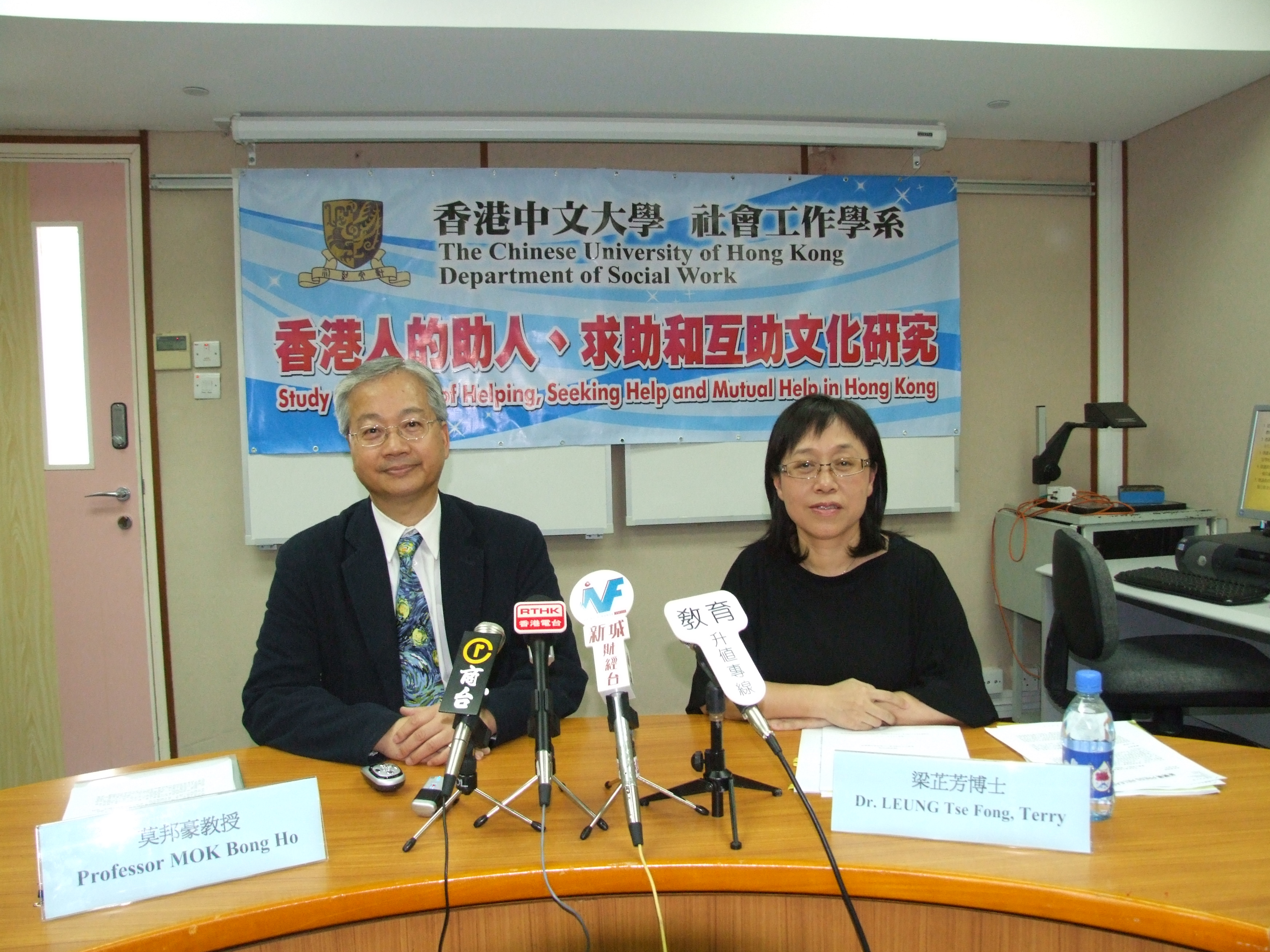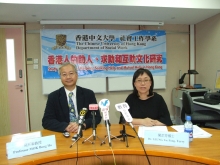CUHK
News Centre
CUHK Department of Social Work Releases Findings of a Study on Culture of Helping, Seeking Help and Mutual Help in Hong Kong
The "community building" programme for fostering mutual care and mutual responsibility has been boldly announced and implemented in Hong Kong ever since the MacLehose era 32 years ago. Nowadays, the Chief Executive and Financial Secretary of Hong Kong also embrace the community building mission and introduce initiatives to establish social enterprise, develop social capital and encourage tripartite partnership, in order to enhance the care and mutual aid culture in Hong Kong. With promotion efforts extended from the MacLehose era to the HKSAR era, it is high time to ask if a culture of mutual care has been successfully incepted in the Hong Kong community. Whose responsibility is it to further the development of a mutual care culture? What strategies can be adopted to further the mutual care culture? A research team comprising Professor Mok Bong-ho and Dr Leung Tse-fong of the Department of Social Work, CUHK conducted a survey on mutual care culture in Hong Kong in May this year. By random sampling, 1,003 Hong Kong residents responded to a telephone interview in the survey (response rate = 48.9%; sampling error < 3.09%).
Study findings
Helping index
The study finds that Hong Kong people’s readiness to help varies with the target of help. The respondents were more ready to render financial assistance to "family members" (83.3%), than "close friends" (51.2%), "next of kin" (49.2%), "vulnerable people" (40%), "neighbors" (18.5%) and "ordinary friends" (12.8%). The study congregates 5 indicator items into a helping index. In a scale from 0 to 10 (where "0" denotes "definitely no help", and "10" denotes "help definitely"), the helping index derived is 5.46, which exceeds the mid point of the scale only marginally.
There were several reasons for the respondents’ lukewarm readiness to help. First of all, some respondents indicated that they did not have sufficient personal resources to help others. Another articulated consideration in the decision to help was the "reasonableness" of the help seeker’s request. Those who valued this factor were more likely to help those vulnerable individuals such as the frail elderly and lone kids. Lastly, "whether the help seeker is able to help himself/herself", and "whether there are alternative resources that the help seeker can use" were also factors affecting the respondents’ motivation to help. In sum, rational judgment premised on the help seeker’s need and reasonableness of request was the basis of the respondents’ decision to help.
Help seeking index
The study finds that the motivation to seek help among Hong Kong people is low. Whilst the respondents were generally ready to seek help from "family members" (63.0%), only 37.4% of the respondents were willing to ask for assistance from "close friends". Seeking help from "ordinary friends" (4.4%) and "neighbors" (3.8%) was not at all popular. Notably, the respondents were more willing to seek help from "Government departments" (45.9%) or "social workers" (30.7%), suggesting a rise in social awareness and a more ready assertion of civic right among the people of Hong Kong. The study congregates 5 indicator items into a help seeking index. In a scale from 0 to 10 (where "0" denotes "definitely won’t seek help", and "10" denotes "definitely will seek help"), the help seeking index derived is 3.69, suggesting that the motivation to seek for financial assistance is very low among the people of Hong Kong.
The research team has several postulations on the reasons for the low help seeking motivation among the respondents. Firstly, the helping index is positively associated with the help seeking index. As the respondents were not enthusiastic about helping other people, they were naturally not eager to seek help when they were in trouble, believing that others would not be ready to help too. Moreover, "face saving" as rooted in Chinese culture may discourage help seeking, which is conceived as "losing face". The ethos of "self reliance" may also contribute to the hesitation in help seeking.
It is worth noting that the help seeking index among elderly people is the lowest among all age groups. Whilst this can be related to their high level of tolerance in the face of problem, it may also be accounted to the "face saving" culture. Amidst the high elderly suicidal rate in Hong Kong (the suicidal rate for those aged 60 and above is 27.6 per 100,000 population), the low help seeking index of elderly persons deserves our serious attention.
Mutual aid index
The study also congregates the helping and help seeking indicator items into a mutual aid index. The mutual aid index is 4.59, suggesting rooms for improvement in the development of mutual care culture in Hong Kong.
When the respondents were asked about their view on who should bear greater responsibility for enhancing the mutual care culture, more than half of them (51.6%) indicated that individual citizens should be responsible. Only 17.1% of the respondents opined that it should be the Government’s responsibility, and 27.2% indicated that it should be the responsibility of both the Government and individual citizens.
Respondents’ background
Statistical analysis of the survey data finds that helping behavior and help seeking behavior are associated with the respondents’ age, religion, occupation and marital status, but not associated with their gender and education level.
Promotion means
To further enhance the mutual care ethos, the respondents were more in favor of the following promotion channels: "family education" (67.4%), "school education" (66.1%), "media promotion" (40.6%), and "community education" (36.8%).
Recommendations
Based on the survey findings, the research team recommends the Government to review the current policy on community building, and to develop concrete policy objective and strategy to build up a mutual care culture in Hong Kong. In the education arena, the general education curriculum in primary and secondary schools can incorporate the mutual care theme. The Parents & Teachers Associations and school social workers in school setting can also play a more active role in facilitating a culture of care and mutual aid among youngsters.
The mass media is also expected to help with the promulgation of the mutual care culture. The Government should make good use of the mass media to strengthen community building in Hong Kong. Meanwhile, self-help organizations in the civil society are positive examples in encouraging the mutual care culture. Increased resource support from the Government is needed to facilitate their sustainability and continued development.





